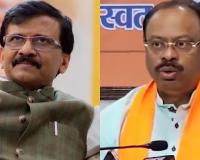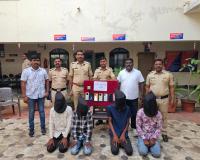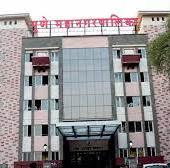- Editorial
- Editorial by Rahi Bhide | The Dark Age Amid the Festival of Lights!
Editorial by Rahi Bhide | The Dark Age Amid the Festival of Lights!

By Rahi Bhide
The festive season of Diwali brings joy and celebration, with lights and sweets marking the victory of hope over despair. Yet, amid this glow, shadows loom. Farmers grapple with the uncertainty of life, worried about how to keep the hearth burning in the wake of devastating floods. While Diwali brings happiness to some, a darker reality confronts the youth of India, the very hands that are supposed to shape the nation’s future are treading a perilous path. It is imperative to eradicate this darkness amid the festival of lights.
Maharashtra has long been associated with farmer suicides, but now the state bears the additional stigma of rising youth suicides. According to the latest report by the National Crime Records Bureau (NCRB), student suicides in India have reached alarming levels, accounting for 7.6% of all suicides nationwide. The tragic death of a cadet at the National Defence Academy (NDA) in Pune has once again brought this issue into the spotlight. Every year, an estimated 13,000 students in India take their own lives.
The root causes are multifaceted: academic pressure, social stress, and the lack of institutional support and awareness. Children are trained for exams but not for life. They are often ill-equipped to handle failure, disappointment, or uncertainty. Mental health education should be a regular part of school curricula, and educational institutions must create environments where students can freely express their concerns and be listened to attentively. Teachers should be trained not only to teach but also to listen.
Beyond academic challenges, students face significant societal pressures. Despite numerous educational reforms and mental health initiatives, excessive academic stress continues to adversely affect youth. To address this, governments must implement programs providing psychological support to students, teachers, and parents. Intense competition, rigorous grading systems, and the lack of mental health services are key contributors to student suicides.
There is a growing sense of unease and distrust within India’s educational system. College counselors should be trained to identify students in need of urgent support, understand suicide risks, and provide appropriate interventions. Institutions must teach students emotional resilience, stress management, and suicide prevention, ensuring they never feel forced to give up on life. “Gatekeeper training” is essential for both students and educators to recognize signs of distress and respond effectively.
A 2019 study conducted jointly by the University of Melbourne, India’s National Institute of Mental Health and Neurosciences, and several Indian medical colleges surveyed over 8,500 students across 30 universities in nine states. It revealed that more than 12% of students had considered suicide, and 6.7% had attempted it at some point in their lives. The study recommended immediate implementation of mental health support and interventions in schools and colleges. The Supreme Court of India has described the situation as a “suicide epidemic” and, in March, established a ten-member national task force to develop a comprehensive strategic framework.
The pressure to succeed at any cost is immense. Tragically, a student’s entire sense of self-worth can hinge on a single exam, and this stress can lead to irreversible consequences. Establishing a robust support system—a protective shield—for students is essential. Most students lack adequate support, navigating academic and personal challenges alone. Mental health services tailored to their needs must be urgently expanded. Narrow definitions of success, gender bias, violence, and limited employment opportunities exacerbate stress and mental health issues.
In 2023, student suicides rose to 13,892, nearly a 65% increase from 2013 and a 34% increase from 2019. Overall suicides in India rose from 135,000 in 2013 to 171,000 in 2023—a 27% increase. Experts attribute this rise to academic pressure, unemployment, mental health challenges, and familial stress. Psychologists highlight that competition and social media pressures are accelerating mental health problems, often leaving students unable to express their struggles. Timely mental health assistance, counseling, and expanded support within educational institutions are crucial. Families and communities must also be sensitive to the mental well-being of children and youth.
Maharashtra leads the nation with 14.7% of student suicides, followed by Madhya Pradesh at 10.5%. In Kota, Rajasthan, a hub for coaching centers, there were 17 student suicides in 2024 and 26 in 2023. By May 2025, 14 students in Kota had already taken their lives. Across occupations in 2023, 27.5% of suicides involved daily wage workers.
Diwali is a festival of light, yet it should also illuminate the darkness engulfing our youth. Urgent, collective action is needed to address the mental health crisis in students and to provide them with the guidance, care, and resilience required to navigate life’s challenges. Only then can we truly celebrate a festival of light that dispels the shadows within our society.
000











